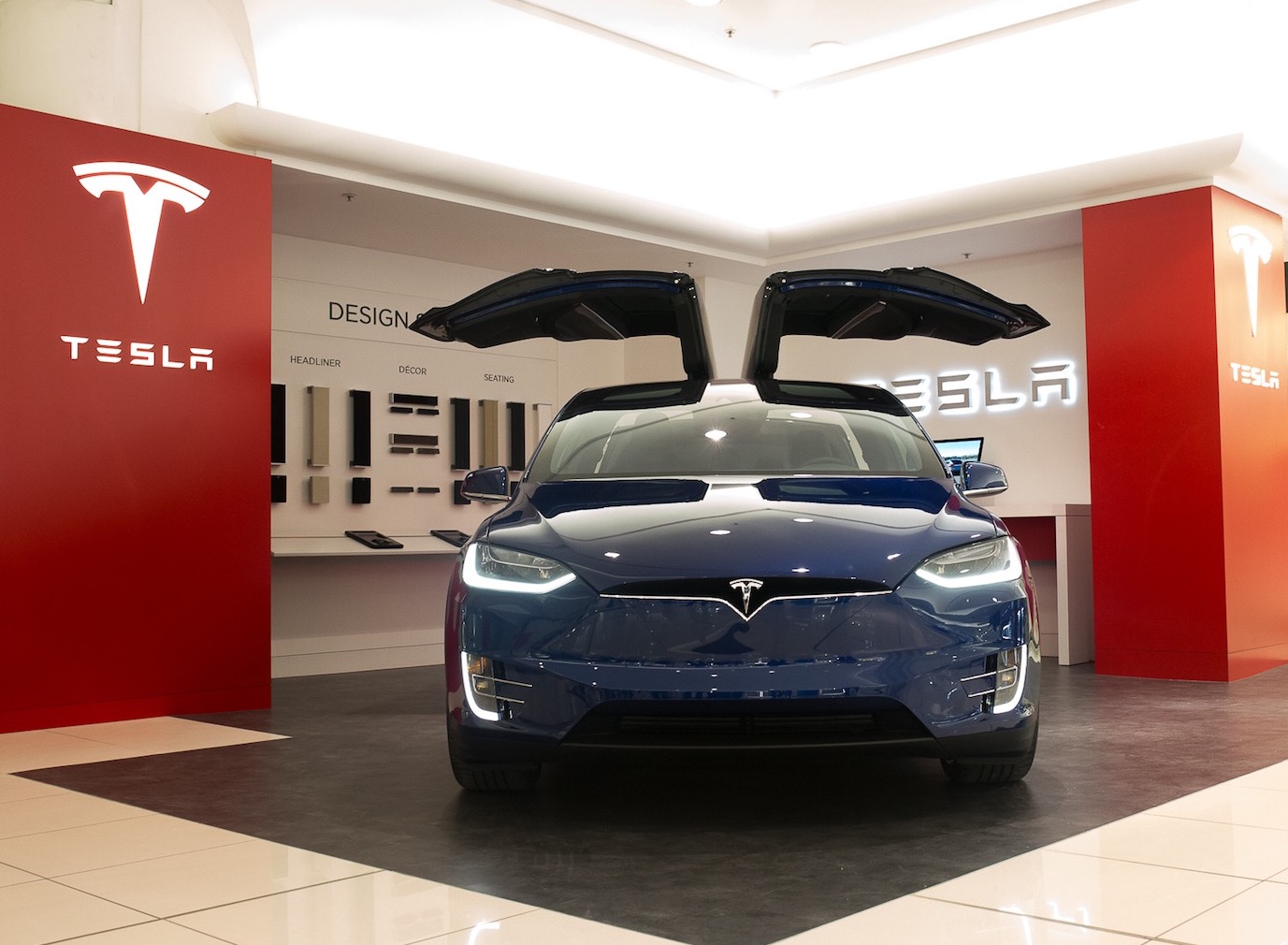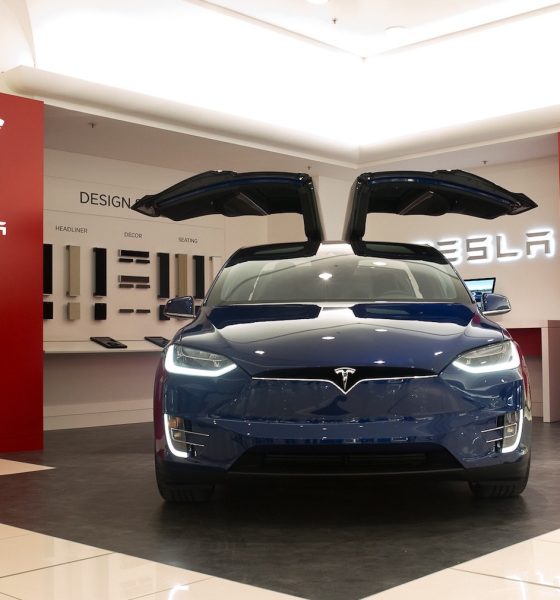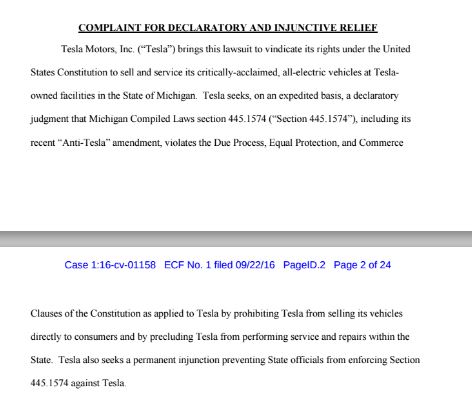

News
Michigan argues Tesla “never sought the ability to directly sell” within state
Michigan officials have filed a response to a Tesla federal lawsuit which alleges that the state has unfairly denied the Silicon Valley-based electric car company from selling cars within the state. At issue is a “Anti-Tesla” amendment that prevents the company’s effort to “sell and service its critically-acclaimed, all-electric vehicles at Tesla-owned facilities” in that state.
The state says they have an entirely different interpretation and call Tesla’s version “incorrect.” Michigan requires that vehicles must be sold through a franchised dealer. Today’s state response includes Michigan’s argument that Tesla “has never sought the ability to directly sell its vehicles in Michigan but only licenses to operate dealerships.”
In an email to The Detroit News today, Tesla said, “If it’s the state’s position that Tesla can sell its cars directly to consumers, Tesla welcomes that opportunity and invites the state to work with us so that we can start serving our customers in Michigan as soon as possible.”
Of course, the Big Three automakers — General Motors, Ford Motor Company, and Fiat Chrysler Automobiles US— have their headquarters in the Detroit area.
An October 2014 Michigan state law bans automakers from selling vehicles directly to consumers. The Michigan Legislature, backed by the state’s new-car dealership lobby, voted strongly in favor of the amendment, which has come to be known as the “anti-Tesla” bill. Many believe that the law was intended to close a loophole that Tesla has used in other states to maintain company-owned retail stores and bypass the dealership route. Tesla’s complaint outlines that the “only conceivable reason” for the law is “to reward the dealers’ generous lobbying efforts by handing them a monopoly.”
Tesla seeks two things in its lawsuit. To start, it is asking for a declaratory judgment that Michigan’s ban on direct-sales violates the Due Process, Equal Protection, and Commerce Clauses of the Constitution as applied to Tesla. The law, Tesla says, prohibits it from selling its vehicles directly to consumers, and it also precludes Tesla from performing service and repairs within the State. Moreover, Tesla wants a permanent injunction preventing state officials from enforcing the law, including the October 2014 amendment.
What’s the state’s retort? The state argues a 2000 state law would not have allowed Tesla to sell its vehicles, and Tesla wasn’t incorporated until three years later. “The statutory scheme that plaintiff claims discriminates against plaintiff has existed in its current form since before plaintiff existed as a company,” the state says in its response.
The Michigan Secretary of State’s office had denied Tesla’s new-dealership license request in September. The governor had declared that the law “clarifies and strengthens” an existing long-standing prohibition of new car direct sales in Michigan. Soon after, on September 22, 2016, Tesla filed the lawsuit in federal court in western Michigan against three individuals: Governor Rick Snyder, Michigan Secretary of State Ruth Johnson, and Attorney General Bill Schuette. The state contends that none of these individuals has “violated any of plaintiff’s constitutional rights, or any rights whatsoever.”
Earlier this month, Tesla opened a Troy gallery showroom, housed within a Nordstrom department store. With an artistic atmosphere, the 700-square-foot space includes a Model X SUV for consumers to scrutinize. However, no sales can be made at the site. Instead, customers must head online for product details and ordering information.
Governor Snyder commented about the Tesla-Nordstrom gallery with a politician’s finesse. “That’s a legal issue that I’ve said would be a good topic for the Legislature to look at, to say what about new manufacturers and those issues. I would encourage our Legislature to look at (Tesla’s gallery surrogate showroom) when they deem appropriate.”
Tesla is requesting a jury trial.
“Tesla will continue to fight for the rights of Michigan consumers to be able to choose how they buy cars in Michigan. Giving auto dealers a monopoly on car sales benefits them, but harms consumers,” said Tesla in a statement.

News
Tesla ships out an update for everyone that California caused
“This change only updates the name of certain features and text in your vehicle,” the company wrote in Release Notes for the update, “and does not change the way your features behave.”

Tesla has shipped out an update for its vehicles that was caused specifically by a California lawsuit that threatened the company’s ability to sell cars because of how it named its driver assistance suite.
Tesla shipped out Software Update 2026.2.9 starting last week; we received it already, and it only brings a few minor changes, mostly related to how things are referenced.
“This change only updates the name of certain features and text in your vehicle,” the company wrote in Release Notes for the update, “and does not change the way your features behave.”
The following changes came to Tesla vehicles in the update:
- Navigate on Autopilot has now been renamed to Navigate on Autosteer
- FSD Computer has been renamed to AI Computer
Tesla faced a 30-day sales suspension in California after the state’s Department of Motor Vehicles stated the company had to come into compliance regarding the marketing of its automated driving features.
The agency confirmed on February 18 that it had taken a “corrective action” to resolve the issue. That corrective action was renaming certain parts of its ADAS.
Tesla discontinued its standalone Autopilot offering in January and ramped up the marketing of Full Self-Driving Supervised. Tesla had said on X that the issue with naming “was a ‘consumer protection’ order about the use of the term ‘Autopilot’ in a case where not one single customer came forward to say there’s a problem.”
This was a “consumer protection” order about the use of the term “Autopilot” in a case where not one single customer came forward to say there’s a problem.
Sales in California will continue uninterrupted.
— Tesla North America (@tesla_na) December 17, 2025
It is now compliant with the wishes of the California DMV, and we’re all dealing with it now.
This was the first primary dispute over the terminology of Full Self-Driving, but it has undergone some scrutiny at the federal level, as some government officials have claimed the suite has “deceptive” names. Previous Transportation Secretary Pete Buttigieg was one of those federal-level employees who had an issue with the names “Autopilot” and “Full Self-Driving.”
Tesla sued the California DMV over the ruling last week.
News
Tesla workers push back against Giga Berlin unionization
“IG Metall did not succeed in Giga Berlin‘s works council election earlier today. The union share was reduced from nearly 40% in 2024 to 31% in 2026! This is a clear message by the Giga Berlin team towards an independent co-determination! The list called Giga United, led by the current chairwoman, Michaela Schmitz, received the most votes with more than 40%! Good news for Giga Berlin!”

Tesla workers pushed back against unionization efforts at Gigafactory Berlin, and over the past few years, there has been a dramatic decrease in interest to unionize at the German plant.
Gigafactory Berlin Plant Manager André Thierig announced on Wednesday that IG Metall, the European union group, saw its share reduce from 40 to 31 percent in 2026 as employees eligible to vote on the issue. Instead, the Giga Berlin team, known as Giga United, received the most votes with more than 40 percent.
BREAKING! 🚨
IG Metall did not succeed in Giga Berlin‘s works council election earlier today. The union share was reduced from nearly 40% in 2024 to 31% in 2026!
This is a clear message by theGiga Berlin team towards an independent co-determination!
The list called Giga…
— André Thierig (@AndrThie) March 4, 2026
Thierig gave specific details in a post on X:
“IG Metall did not succeed in Giga Berlin‘s works council election earlier today. The union share was reduced from nearly 40% in 2024 to 31% in 2026! This is a clear message by the Giga Berlin team towards an independent co-determination! The list called Giga United, led by the current chairwoman, Michaela Schmitz, received the most votes with more than 40%! Good news for Giga Berlin!”
There were over 10,700 total employees who were eligible to vote, with 87 percent of them turning out to cast what they wanted. There were three key outcomes: Giga United, IG Metall, and other notable groups, with the most popular being the Polish Initiative.
The 37-seat council remains dominated by non-unionized representatives, preserving Giga Berlin as Germany’s only major auto plant without a collective bargaining agreement.
Thierig and Tesla framed the outcome as employee support for an “independent, flexible, and unbureaucratic” future, enabling acceleration on projects like potential expansions or new models. IG Metall expressed disappointment, accusing management of intimidation tactics and an “unfair” campaign.
The first election of this nature happened back in 2022. In 2024, IG Metall emerged as the largest single faction with 39.4 percent, but non-union lists coalesced for a majority.
But this year was different. There was some extra tension at Giga Berlin this year, as just two weeks ago, an IG Metall rep was accused by Tesla of secretly recording a council meeting. The group countersued for defamation.
Tesla Giga Berlin plant manager faces defamation probe after IG Metall union complaint
This result from the 2026 vote reinforced Tesla’s model of direct employee-management alignment over traditional German union structures, amid ongoing debates about working conditions. IG Metall views it as a setback but continues advocacy. Tesla sees it as validation of its approach in a competitive EV market.
This outcome may influence future labor dynamics at Giga Berlin, including any revival of expansion plans or product lines, which Musk has talked about recently.
News
SpaceX President Gwynne Shotwell details xAI power pledge at White House event
The commitment was announced during an event with United States President Donald Trump.

SpaceX President Gwynne Shotwell stated that xAI will develop 1.2 gigawatts of power at its Memphis-area AI supercomputer site as part of the White House’s new “Ratepayer Protection Pledge.”
The commitment was announced during an event with United States President Donald Trump.
During the White House event, Shotwell stated that xAI’s AI data center near Memphis would include a major energy installation designed to support the facility’s power needs.
“As you know, xAI builds huge supercomputers and data centers and we build them fast. Currently, we’re building one on the Tennessee-Mississippi state line. As part of today’s commitment, we will take extensive additional steps to continue to reduce the costs of electricity for our neighbors…
“xAI will therefore commit to develop 1.2 GW of power as our supercomputer’s primary power source. That will be for every additional data center as well. We will expand what is already the largest global Megapack power installation in the world,” Shotwell said.
She added that the system would provide significant backup power capacity.
“The installation will provide enough backup power to power the city of Memphis, and more than sufficient energy to power the town of Southaven, Mississippi where the data center resides. We will build new substations and invest in electrical infrastructure to provide stability to the area’s grid.”
Shotwell also noted that xAI will be supporting the area’s water supply as well.
“We haven’t talked about it yet, but this is actually quite important. We will build state-of-the-art water recycling plants that will protect approximately 4.7 billion gallons of water from the Memphis aquifer each year. And we will employ thousands of American workers from around the city of Memphis on both sides of the TN-MS border,” she noted.
The Ratepayer Protection Pledge was introduced as part of the federal government’s effort to address concerns about rising electricity costs tied to large AI data centers, as noted in an Insider report. Under the agreement, companies developing major AI infrastructure projects committed to covering their own power generation needs and avoiding additional costs for local ratepayers.









